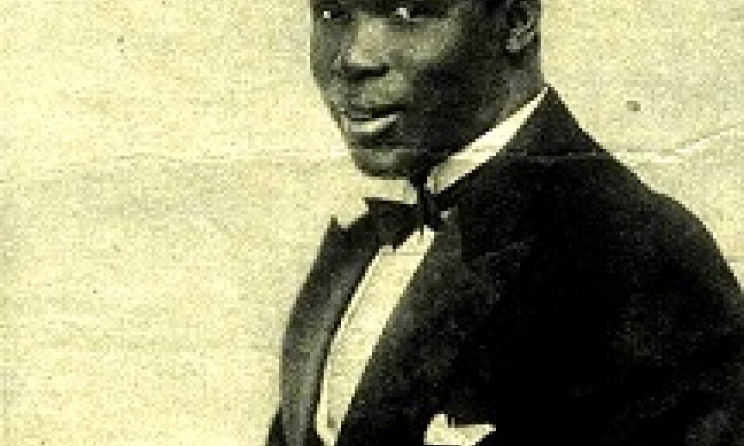August Agboola Browne Nigerian pioneer of Jazz Music and World War 2 hero
August Agboola Browne is, unknown to most, probably the first West African to record a Jazz album. The same of which was released in Poland in 1928.
 Image from album cover of August Browne's 1928 Jazz album
Image from album cover of August Browne's 1928 Jazz album August Browne in the uniform of the Polish resistance in 1944.
August Browne in the uniform of the Polish resistance in 1944.
This landmark has its origin's in the story of a man who was born in Lagos, Nigeria in 1895 and who it is said, stowed away on a ship and travelled to Poland in 1922. He eked out a basic living as a labourer in the Warsaw docks, until the mid-1920's. By which time, he began to frequent the various cafe's and night-spots of 1920's Warsaw, which had a quite a vibrant entertainment scene at the time, with jazz and burlesque clubs, providing a modern adjunct to it's old world cultural charm. Warsaw was in fact described as 'the Paris of the north', for these reasons.
Browne taught himself to play the drums and shortly after, became one of Warsaw's most popular jazz drummers. He went on to record an album in 1928, making him the first Nigerian to achieve this, and arguably the first West African. Browne gained fame playing as part of a quartet in Warsaw's famous Ziemanska club, where his imposing height (6 feet plus), good looks and African origins set him apart.
He married a Polish woman Zofyja in 1927, and they had two kids, Ryszard and Aleksandra in 1928 and 1929 respectively. The mariage was not without drama. A notable incident being in 1931, when Browne left home after an argument with his wife, and stayed away, playing gigs for a few days. His wife not to be outdone, placed a missing persons ad in the Warsaw newspapers, of which poor Browne had to respond a few days later, sheepishly explaining that he had merely been out earning a living and pleading with his wife not to wash their dirty linen in public. This incident aside, Browne was widely acknowledged by friends and neighbours as a courteous, well-mannered gentleman, who was much loved and respected by most who knew him.
His life was to change radically, when the Second World War started in 1939. Poland was one of the first targets of the Nazi war machine and as was top be expected, a major exodus of its dwellers- especially its small African minority, who rather wisely decided not to test Hitler's tolerance, especially after reading his views on African's, in his book 'Mein kampf'. Warsaw was thus emptied of its African population, except one, August Agboola Browne.
Browne joined the Polish underground resistance movement and participated in the futile defence of Warsaw, where he was sighted by witnesses, fighting in the defence of the Ochota district alongside other members of the resistance. After the fall of Warsaw, Browne went virtually underground, but was on a number of occasions, seen around Warsaw, distributing the newsheet of the Polish resistance. To underscore the quantum of courage involved in this would be beyond the realm of a short online article, suffice to say that if he had been caught by the Nazi's, his fate would not have been pleasant.
This was not to be the end of his activities in this war. In the Polish uprising of 1944, in which the resistance came out from the underground, Browne fought actively as part of the Polish 2 Battalion led by Major Georg Antoczewiszka. This was confirmed by a resistance veteran Jan Radecki, who saw him at the headquarters of the Iwo Battalion at Ulica. The uprising lasted 63 days, till October 1944, of which Browne was an active participant. Though unsuccessful, Warsaw was shortly after liberated by the Allies in April 1945,
Browne submitted his claims to the new communist government for recognition of his war-time service, which was to be fully verified and he was accorded his full honours as a hero of the Polish resistance. He was then employed as a Cultural Officer by the communist government in 1949. He was however to tire of Poland, which he now felt to be a closed, colourless society, compared to its postwar vibrancy. He moved to England in 1958, where he lived till his death in 1976.
Inspite of his having passed away, almost 40 years ago, Browne's memory is rightly accorded commemoration in present-day Poland, for his war-time sacrifices and also for his status as Warsaw's first African jazz musician. However what is more concerning is that Browne does not have the same recognition of his pioneering status, as the first Nigerian to record a jazz album, where other pioneers like the Reverend Josiah Ransome-Kuti is recognised as the first to record an album(1922) and Ladipo Solanke and Justus Domingo were the joint first to record popular music albums (1925). Perhaps with this article and at least one other prior publication, this anomaly would go some way, to being redressed.



























Commentaires
s'identifier or register to post comments